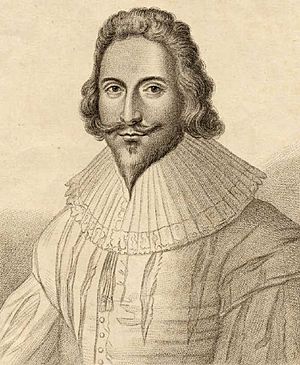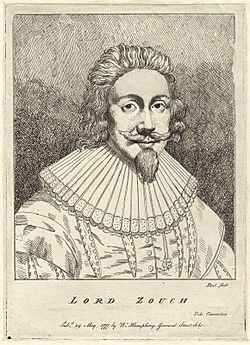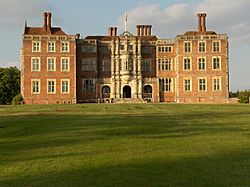Edward la Zouche, 11th Baron Zouche facts for kids
Quick facts for kids
The Lord Zouche
|
|
|---|---|
 |
|
| Lord Warden of the Cinque Ports | |
| In office 1615–1625 |
|
| Preceded by | The Earl of Somerset |
| Succeeded by | The Duke of Buckingham |
| Personal details | |
| Born | 6 June 1556 |
| Died | 18 August 1625 (aged 69) |
| Spouse | Eleanor Zouche Sarah Harrington |
| Parent | George la Zouche, 10th Baron Zouche |
Edward la Zouche, 11th Baron Zouche (born June 6, 1556 – died August 18, 1625) was an important English diplomat. A diplomat is someone who represents their country in dealings with other countries. Lord Zouche is remembered for two main things: he was the only person to vote against punishing Mary, Queen of Scots, and he was involved in a hunting accident where his guest, the Archbishop of Canterbury, accidentally killed a man.
Contents
Early Life and Family
Edward Zouche was the son of George la Zouche, 10th Baron Zouche. His family, the Zouche dynasty, came from a noble background in Brittany, France. His mother was Margaret Welby.
When he was young, starting in 1570, Edward was looked after by William Cecil, 1st Baron Burghley, a very powerful person in the royal court. Edward later admitted that he spent a lot of his family's money when he was younger, saying he didn't focus much on learning.
Marriages
Around 1578, Edward Zouche married his cousin, Eleanor Zouche. They had two daughters named Elizabeth and Mary. However, soon after Mary was born in 1582, Edward and Eleanor began to live separately. They remained apart until Eleanor passed away in 1611.
About a year after Eleanor's death, Lord Zouche married again. His second wife was Sarah Harington (1565-1629). Sarah had been married twice before. She had no children with Edward Zouche. After Edward died, Sarah married Sir Thomas Edmondes.
What Lord Zouche Did
Edward Zouche went to Trinity College, Cambridge in 1570 and later studied law at Gray's Inn.
He was chosen to be part of the group that decided the fate of Mary, Queen of Scots. Mary was the Queen of Scotland and a cousin of Queen Elizabeth I of England. She was accused of trying to take the English throne. Edward Zouche was the only one who disagreed with the decision to punish her.
Later in his career, he served as an ambassador to Scotland and Denmark, representing England in those countries. He was also the Lord President of the Council of Wales, which was a governing body for Wales and some English counties. From 1603, he was a member of the Privy Council, a group of advisors to the King.
In 1594, Zouche was an ambassador in Scotland when Prince Henry was born. At one point, he and another diplomat lent money to a Scottish nobleman named Francis Stewart, 5th Earl of Bothwell. This caused some trouble because the English Queen, Elizabeth I, didn't want it to look like she was secretly supporting Bothwell.
Lord Zouche was also interested in the New World, especially the new colonies being set up in America. He was a commissioner for the Virginia Company starting in 1608. He also loved gardening and had a special "physic garden" (a garden for medicinal plants) at his house in Hackney. He even hired a famous botanist, Matthias de l'Obel, as his gardener.
In 1605, Zouche bought a large estate called Bramshill in Hampshire. He soon began building the grand house that stands there today. King James I visited Bramshill in 1620. The next year, George Abbot, who was the Archbishop of Canterbury (the most important bishop in England), came to Bramshill to bless a chapel for Lord Zouche.
During this visit, the Archbishop joined Lord Zouche for a stag hunt. Sadly, the Archbishop accidentally shot and killed a gamekeeper who walked into his line of fire. Everyone, including Lord Zouche, agreed it was a terrible accident. However, this event greatly damaged the Archbishop's reputation. He remains the only Archbishop of Canterbury to have ever killed a person.
The More Children and the Mayflower
In 1620, Lord Zouche helped with a difficult situation involving his secretary, Samuel More. Samuel More was the eldest son of a respected politician. There was a long and bitter family dispute.
Eventually, four of Samuel More's children were sent to the Colony of Virginia on the ship Mayflower. This happened without their mother's knowledge. Lord Zouche, who was a commissioner for the Virginia Company, advised sending the children far away. He helped Samuel More and his father find a distant place for the children to go.
Death and Legacy
Edward Zouche passed away in 1625 after being ill for some time. We don't know exactly where he was buried. The famous writer Ben Jonson even wrote a poem about wanting to be buried near Lord Zouche.
After Lord Zouche died, his title, the Barony of Zouche, was put on hold. This is called "abeyance." It was shared between his two daughters, Mary and Elizabeth, and their families. The title was finally given to Cecil Bisshopp, 12th Baron Zouche in 1815, who was a descendant of Elizabeth.
Images for kids
 | Delilah Pierce |
 | Gordon Parks |
 | Augusta Savage |
 | Charles Ethan Porter |




